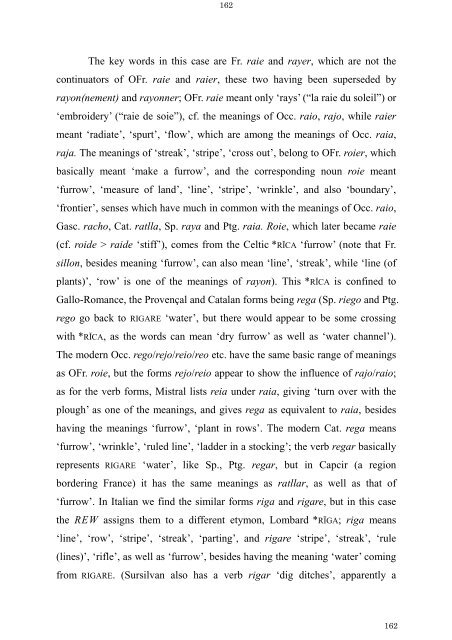The Latin Neuter Plurals in Romance - Page ON
The Latin Neuter Plurals in Romance - Page ON
The Latin Neuter Plurals in Romance - Page ON
You also want an ePaper? Increase the reach of your titles
YUMPU automatically turns print PDFs into web optimized ePapers that Google loves.
162<br />
<strong>The</strong> key words <strong>in</strong> this case are Fr. raie and rayer, which are not the<br />
cont<strong>in</strong>uators of OFr. raie and raier, these two hav<strong>in</strong>g been superseded by<br />
rayon(nement) and rayonner; OFr. raie meant only ‘rays’ (“la raie du soleil”) or<br />
‘embroidery’ (“raie de soie”), cf. the mean<strong>in</strong>gs of Occ. raio, rajo, while raier<br />
meant ‘radiate’, ‘spurt’, ‘flow’, which are among the mean<strong>in</strong>gs of Occ. raia,<br />
raja. <strong>The</strong> mean<strong>in</strong>gs of ‘streak’, ‘stripe’, ‘cross out’, belong to OFr. roier, which<br />
basically meant ‘make a furrow’, and the correspond<strong>in</strong>g noun roie meant<br />
‘furrow’, ‘measure of land’, ‘l<strong>in</strong>e’, ‘stripe’, ‘wr<strong>in</strong>kle’, and also ‘boundary’,<br />
‘frontier’, senses which have much <strong>in</strong> common with the mean<strong>in</strong>gs of Occ. raio,<br />
Gasc. racho, Cat. ratlla, Sp. raya and Ptg. raia. Roie, which later became raie<br />
(cf. roide > raide ‘stiff’), comes from the Celtic *RĬCA ‘furrow’ (note that Fr.<br />
sillon, besides mean<strong>in</strong>g ‘furrow’, can also mean ‘l<strong>in</strong>e’, ‘streak’, while ‘l<strong>in</strong>e (of<br />
plants)’, ‘row’ is one of the mean<strong>in</strong>gs of rayon). This *RĬCA is conf<strong>in</strong>ed to<br />
Gallo-<strong>Romance</strong>, the Provençal and Catalan forms be<strong>in</strong>g rega (Sp. riego and Ptg.<br />
rego go back to RIGARE ‘water’, but there would appear to be some cross<strong>in</strong>g<br />
with *RĬCA, as the words can mean ‘dry furrow’ as well as ‘water channel’).<br />
<strong>The</strong> modern Occ. rego/rejo/reio/reo etc. have the same basic range of mean<strong>in</strong>gs<br />
as OFr. roie, but the forms rejo/reio appear to show the <strong>in</strong>fluence of rajo/raio;<br />
as for the verb forms, Mistral lists reia under raia, giv<strong>in</strong>g ‘turn over with the<br />
plough’ as one of the mean<strong>in</strong>gs, and gives rega as equivalent to raia, besides<br />
hav<strong>in</strong>g the mean<strong>in</strong>gs ‘furrow’, ‘plant <strong>in</strong> rows’. <strong>The</strong> modern Cat. rega means<br />
‘furrow’, ‘wr<strong>in</strong>kle’, ‘ruled l<strong>in</strong>e’, ‘ladder <strong>in</strong> a stock<strong>in</strong>g’; the verb regar basically<br />
represents RIGARE ‘water’, like Sp., Ptg. regar, but <strong>in</strong> Capcir (a region<br />
border<strong>in</strong>g France) it has the same mean<strong>in</strong>gs as ratllar, as well as that of<br />
‘furrow’. In Italian we f<strong>in</strong>d the similar forms riga and rigare, but <strong>in</strong> this case<br />
the REW assigns them to a different etymon, Lombard *RĪGA; riga means<br />
‘l<strong>in</strong>e’, ‘row’, ‘stripe’, ‘streak’, ‘part<strong>in</strong>g’, and rigare ‘stripe’, ‘streak’, ‘rule<br />
(l<strong>in</strong>es)’, ‘rifle’, as well as ‘furrow’, besides hav<strong>in</strong>g the mean<strong>in</strong>g ‘water’ com<strong>in</strong>g<br />
from RIGARE. (Sursilvan also has a verb rigar ‘dig ditches’, apparently a<br />
162









